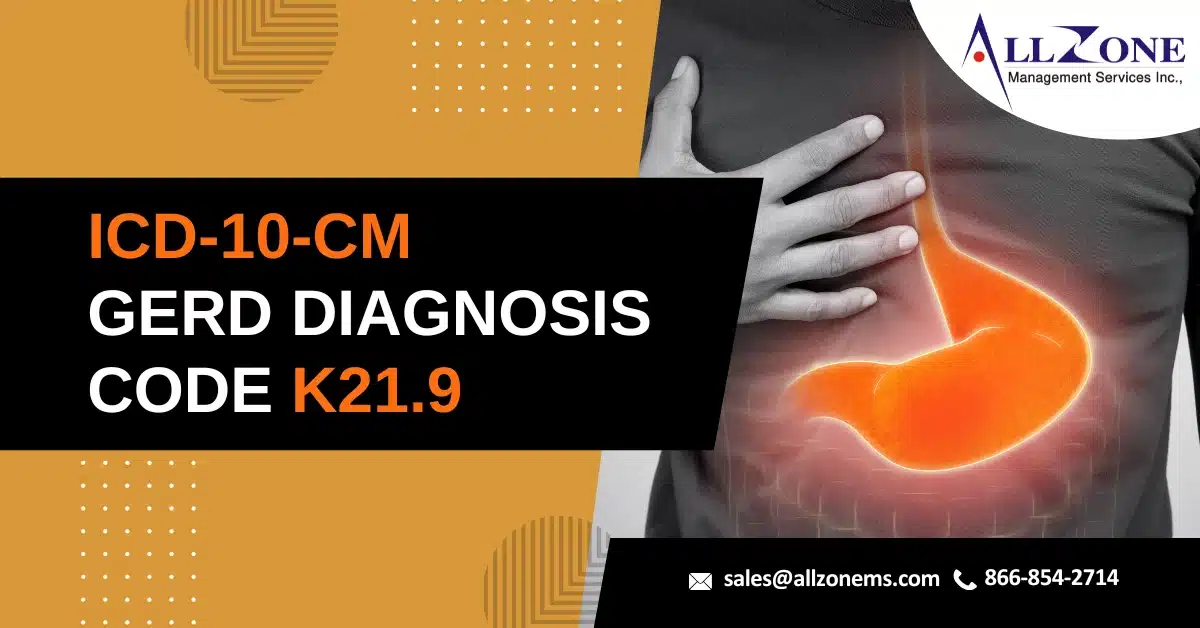Gastroesophageal Reflux Disease (GERD) is one of the most frequently diagnosed conditions in clinical settings, especially among gastroenterology practices. With rising patient visits related to acid reflux and indigestion symptoms, accurate coding plays a crucial role in ensuring proper documentation, reimbursement, and compliance. The ICD-10-CM diagnosis code K21.9 is widely used for GERD cases that are not associated with esophagitis.
However, incorrect usage of this code can lead to claim denials, delayed payments, and compliance risks. That’s where professional medical coding and billing solutions from Allzone Management Services ensure accuracy and maximum reimbursement.
What is ICD-10-CM Code K21.9?
ICD-10-CM Code: K21.9
Description: Gastro-esophageal reflux disease without esophagitis.
Category: Diseases of the digestive system.
This code is used to report cases where the patient has GERD symptoms, but there is no documentation of esophagitis, inflammation, or other complications in the esophagus.
Common Symptoms Related to K21.9 Documentation
When assigning K21.9, medical coders must ensure physician documentation supports GERD symptoms such as:
- Persistent heartburn
- Acid regurgitation
- Chest discomfort related to reflux
- Chronic cough due to reflux
- Difficulty swallowing (mild)
- Sour or bitter taste in the mouth
If diagnostic tests like endoscopy or pH monitoring do not show esophagitis, K21.9 is the appropriate code.
When Should You Use ICD-10-CM K21.9?
Use 9 only when:
- GERD is diagnosed by a physician.
- No evidence of esophagitis is present.
- The provider does not specify complications or underlying esophageal involvement.
- Symptoms are consistent with acid reflux but lack clinical confirmation of inflammation.
What if Esophagitis is Present?
If the documentation states that GERD is associated with esophagitis, then K21.0 (Gastro-esophageal reflux disease with esophagitis) should be used instead of K21.9.
| GERD Type | ICD-10-CM Code | Description |
| Without esophagitis | K21.9 | GERD without esophagitis |
| With esophagitis | K21.0 | GERD with esophagitis |
Coding Tips for Accurate Reimbursement
To avoid denials and coding errors, follow these best practices:
- Confirm diagnosis in physician documentation.
- Review endoscopy or imaging results.
- Avoid using K21.9 when esophagitis or Barrett’s esophagus is mentioned.
- Check for linked conditions like hiatal hernia (K44.9), which may require additional coding.
- If symptoms only are documented (e.g., heartburn), do not use K21.9—use R12 (Heartburn)
Related Codes Often Used With K21.9
| Code | Description |
| K21.0 | GERD with esophagitis |
| R12 | Heartburn (if GERD is not confirmed) |
| K44.9 | Hiatal hernia, unspecified |
| J45.909 | Asthma due to reflux |
| R05.9 | Chronic cough (if related to GERD) |
Why Accurate Coding for GERD Matters
Incorrect coding or unspecified diagnosis can cause:
- Claim rejections due to lack of specificity.
- Improper reimbursement for services rendered.
- Potential issues during payer audits.
- Increased accounts receivable (A/R) backlog.
By using ICD-10-CM K21.9 correctly, healthcare providers ensure accurate reporting and proper payment.
Billing & Documentation Guidelines
Here are some documentation requirements to support K21.9:
- Clinical diagnosis stating GERD.
- Absence of esophagitis confirmed via EGD/endoscopy.
- Physician notes detailing reflux-related symptoms.
- Treatment/medication prescribed (PPIs, antacids, H2 blockers).
Example documentation:
“Patient reports frequent heartburn and acidic taste. Endoscopy shows no inflammation of the esophagus. Diagnosed as GERD without esophagitis. Started on proton pump inhibitor therapy.”
Appropriate code: K21.9
Common Denial Reasons Related to K21.9
| Denial Reason | Cause |
| Lack of supporting documentation | Provider did not confirm GERD diagnosis |
| Incorrect use of K21.9 | Esophagitis was present but code used was GERD unspecified |
| Only symptoms recorded | No confirmed GERD diagnosis from provider |
To overcome these denial issues, professional coding review is essential.
How Allzone Ensures Accurate ICD-10 Coding for GERD
At Allzone Management Services, we ensure high-accuracy coding for GERD-related diagnoses using:
- AAPC-certified coders
- Real-time payer policy compliance
- Thorough clinical documentation improvement (CDI)
- Dual coding audits to eliminate errors
- Specialty-specific coding practices (gastroenterology, internal medicine)
Our expert coders help you:
- Assign the most specific GERD code
- Maximize reimbursement
- Avoid payer denials
- Comply with CMS coding updates
- Improve charge capture efficiency
Benefits of Outsourcing ICD-10-CM Coding to Allzone
Outsourcing coding services to Allzone ensures:
- 98%+ coding accuracy
- Reduced billing errors
- Timely claims submission
- Lower compliance risks
- Improved revenue outcomes
- Reduced operational burden
- Scalability for high patient volumes
We support providers, medical billing companies, gastroenterology practices, hospitals, and RCM firms with reliable ICD-10-CM coding solutions.
Conclusion
ICD-10-CM K21.9 plays a crucial role in documenting and billing GERD cases without esophagitis. Accurate code selection ensures compliance, reduces denials, and supports proper reimbursement. Partnering with Allzone helps healthcare providers eliminate coding errors and optimize financial performance with expert ICD-10 coding support.

